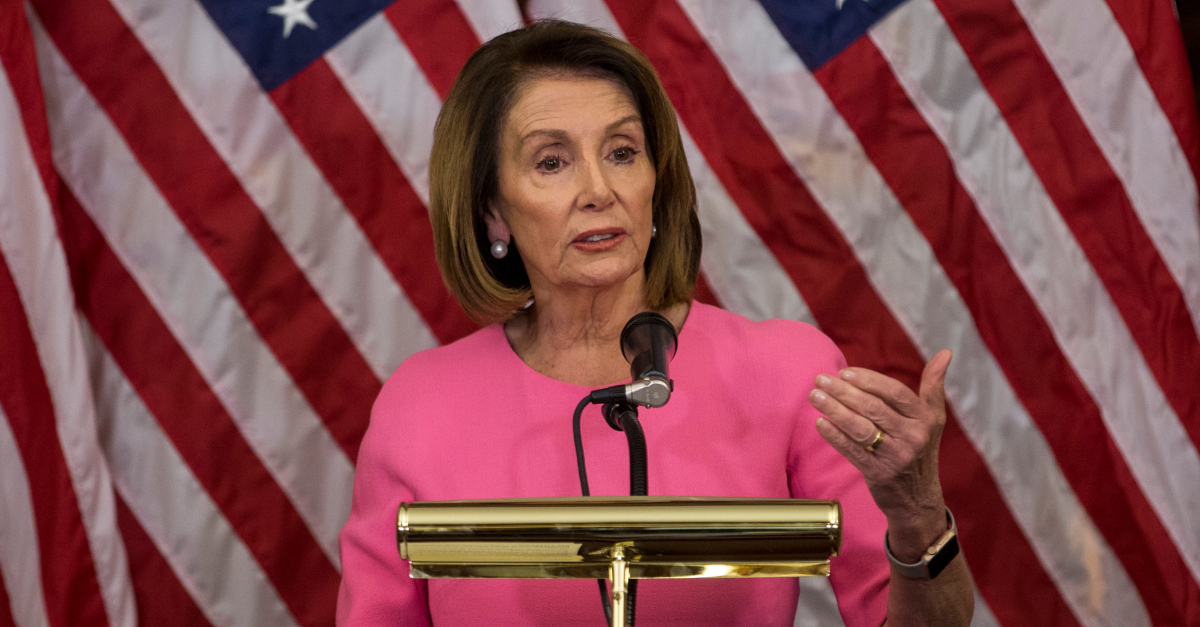
Nancy Pelosi just started her 2019 speakership with a warning shot: she told NBC that whether President Trump could be indicted during his presidency is “an open discussion.” This is kind of big news, because in the past, Pelosi, along with most political types and many legal experts have stuck close to the accepted script: sitting presidents can be impeached, but not indicted. In an exchange with NBC’s Savannah Guthrie, Pelosi didn’t at first seem eager to opine on the legality of presidential indictment, first side-stepping Guthrie’s question about a “sitting president,” by clarifying that a president can be indicted after he or she is removed.
Hesitance aside, though, Pelosi eventually said it. It’s possible that a sitting president could be indicted. Perhaps Pelosi’s change came as a result of having hired Douglas N. Letter as the House counsel – or perhaps she’s just been reading Law & Crime’s analysis on the matter. Either way, it seems that the time has finally come for talking points to mirror legal reality.
Prior to 2016, presidential immunity from criminal prosecution was rarely, if ever, discussed. Absolute immunity under the law was assumed – a stance that was reflected in DOJ guidelines. Rudy Giuliani declared about Robert Mueller’s team: “All they get to do is write a report. They can’t indict.”
It’s important, though, to differentiate between DOJ guidelines and Constitutional analysis. Under the law, Pelosi is exactly right. Presidential immunity is an open question – one that has been asked, but never answered.
During the Watergate scandal, the issue of presidential immunity from criminal prosecution was fully briefed and argued before the Supreme Court. U.S. v. Nixon raised many novel and important issues of law, and in a classic SCOTUS move, the Court chose to decide the case on grounds other than immunity, leaving the issue open for lo these many years.
SCOTUS’ non-answer on the matter wasn’t for lack of legal jousting, either. At the time, James D. St. Clair was Richard Nixon’s lawyer, and Leon Jaworski was the 1977 version of Robert Mueller. St. Clair wrote in his brief, “It has never been seriously disputed by legal scholars, jurists, or constitutional authorities that a President may not be indicted while he is an incumbent.”
St. Clair had two main arguments: 1) because executive power to enforce law vests in the president alone, he could not possibly be subject to prosecution; and 2) because the Constitution specifically discusses a post-impeachment prosecution, the framers must have meant that there was no such thing as a pre-impeachment prosecution.
Both arguments make logical sense, but neither is undebatable. Sure the president is the chief executive, but he’s neither above the law nor the sole executive authority. In years since Watergate, we’ve seen SCOTUS rule that a president is not immune from the peskiness of a civil lawsuit, so it’s hardly unthinkable that the Court could rule similarly on the issue of a criminal one.
The point about framers’ intent is similarly unsettled. As Leon Jaworski himself argued, the reference to post-term prosecution could simply have been the framers’ way of insuring that an impeached official could not raise a double-jeopardy objection to a subsequent prosecution. Further, it’s clear that executive officials who are not the president can be prosecuted while in office – and it’s something of a logical leap to conclude that the clause intended to subject the president to lesser scrutiny than other members of his branch. If there’s anything we know about the framers, it’s that they were hell-bent on creating legalized tyranny. So there’s that.
Of course, the two arguments offered up in Nixon’s case are just a starting point; should Mueller decide to indict, lawyers on both sides will likely come up with more arguments and counterarguments. Even if the question ultimately gets decided in Trump’s favor, the “open question” of an indictment has potential to destroy the Trump presidency all on its own.
Indictments, after all, aren’t the only thing a grand jury can produce in response to Mueller’s presentation of a case. Under 18 U.S. Code § 3333, a grand jury can, instead of indictment, submit a report to the court, “concerning noncriminal misconduct, malfeasance, or misfeasance in office involving organize criminal activity by an appointed public officer or employee as the basis for a recommendation of removal or disciplinary action.”
That “disciplinary action” would be pronounced, “impeachment.” The grand jury might very well sift through Mueller’s evidence and return an official recommendation that Trump be removed from office based on his being involved with “organized criminal activity.” Don’t take my word for it – check out the DOJ guidelines. which clarify the weight and context of grand jury reports:
The wording and the legislative history of 18 U.S.C. §§ 3332(a) and 3333(b)(1) indicate that a special grand jury should not investigate for the sole purpose of writing a report; the report must emanate from the criminal investigation.
Sure, I suppose the DOJ could also ignore those guidelines – but that seems less likely. In fact, a grand jury report could work as the ultimate scapegoat for Republicans wishing to distance themselves from personal responsibility for ousting Trump. Impeachment would simply become “following through on what the grand jury directed.”
Whether Congress would, if faced with these choices, follow through is yet another “open discussion,” but one thing is for sure: Nancy Pelosi is getting it started.
[Image via Zach Gibson/Getty Images]
This is an opinion piece. The views expressed in this article are those of just the author.